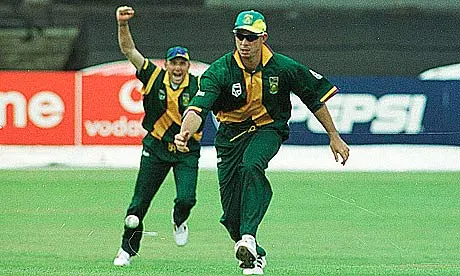
Dropped catches in cricket can be game-changing moments, and in ICC Cricket World Cup history, there have been several costly drops that have had a significant impact on matches and tournaments. Here are five memorable instances of costliest dropped catches in different World Cups.
You might like: Top 5 Batsmen with Most World Cup Centuries
1. Herschelle Gibbs drops Steve Waugh in 1999
This is perhaps the most famous case of a dropped catch that changed the course of the World Cup. In the Super Six stage, South Africa faced Australia at Headingley, Leeds. South Africa had scored 271/7 in their innings, thanks to a century by Gibbs. Australia were struggling at 48/3 when Gibbs dropped a simple catch of Steve Waugh at mid-wicket, off the bowling of Lance Klusener.

Waugh allegedly told Gibbs, “You’ve just dropped the World Cup, mate”. Waugh went on to score an unbeaten 120 and guided Australia to a two-wicket win. Australia and South Africa met again in the semifinal, which ended in a dramatic tie, with Australia advancing to the final on net run rate. Australia eventually won the World Cup for the second time, beating Pakistan in the final.
2. Trent Boult drops Ben Stokes in 2019
The 2019 World Cup final between England and New Zealand was one of the most thrilling matches in cricket history. It ended in a tie, and then a super over, which also ended in a tie. England were declared the winners on the basis of boundary count. However, the match could have had a different result if Trent Boult had not dropped Ben Stokes at the long-on boundary in the final over of England’s innings.

Stokes was on 83 when he hit a full toss from Jimmy Neesham towards Boult, who caught the ball but stepped on the rope as he threw it back to Martin Guptill. It was signalled as a six, and Stokes went on to score 84 not out, taking the match to the super over. Stokes also played a crucial role in the super over, scoring eight runs
3. Mujeeb ur Rahman drops Glenn Maxwell in 2023
The 2023 World Cup saw a remarkable comeback by Australia, who were in a precarious position in the group stage, having lost three of their first four matches. They needed to win their last match against Afghanistan to qualify for the semifinal. Afghanistan had scored 291/9 in their innings, with Rahmat Shah scoring a century. Australia were reduced to 91/7 in their chase, with Glenn Maxwell being the last recognised batsman.

He was on 10 when he was dropped by Mujeeb ur Rahman at short fine leg, off the bowling of Noor Ahmad. Maxwell made the most of the reprieve and scored an unbeaten 201, the first double century by an Australian in ODIs and the first by a non-opener in the format. He added 202 runs with Pat Cummins, who scored 71 not out, and took Australia to a three-wicket win with two balls to spare.
4. Kiran More drops Javed Miandad in 1992
The 1992 World Cup was the first to feature coloured clothing, white balls, and day-night matches. It was also the first to have a round-robin format, with nine teams playing each other once. Pakistan had a poor start to the tournament, losing three of their first five matches, and needing to win their remaining four to qualify for the semifinal. They faced India in their sixth match at the Sydney Cricket Ground. India had scored 216/7 in their innings, with Sachin Tendulkar top-scoring with 54. Pakistan were 85/2 in their chase, when Javed Miandad, who was on 23, edged a delivery from Manoj Prabhakar to the wicketkeeper Kiran More.

More, however, failed to hold on to the catch, and Miandad survived. Miandad went on to score 57 not out, and shared an unbeaten 103-run partnership with Inzamam-ul-Haq, who scored 60 not out. Pakistan won the match by four wickets, and kept their hopes alive. They won their next three matches, and then beat New Zealand in the semifinal and England in the final, to win their first and only World Cup title.
5. Marlon Samuels drops Martin Guptill in 2015
The 2015 World Cup was co-hosted by Australia and New Zealand, and both teams reached the final for the first time. However, before that, they had to face each other in the quarterfinal at the Wellington Regional Stadium. New Zealand had won all their six group matches, while West Indies had won three and lost three. West Indies won the toss and elected to field first. They got an early breakthrough when Jerome Taylor dismissed Brendon McCullum for 12. However, they missed a golden opportunity to get rid of Martin Guptill in the same over, when he was on four.

Guptill edged a delivery to Marlon Samuels at second slip, but Samuels dropped the catch. Guptill made West Indies pay dearly for the mistake, as he scored a record-breaking 237 not out, the highest individual score in World Cup history and the second-highest in ODIs. He hit 24 fours and 11 sixes, and helped New Zealand post 393/6, their highest total in World Cups. West Indies were never in the chase, and were bowled out for 250, with Trent Boult taking four wickets. New Zealand won by 143 runs, and advanced to the semifinal, where they beat South Africa in a nail-biting finish.



